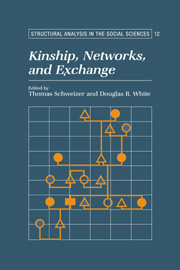Book contents
- Frontmatter
- Contents
- Preface
- List of contributors
- 1 Revitalizing the Study of Kinship and Exchange with Network Approaches
- I Representing Kinship Dynamics, Material Flow, and Economic Cooperation
- II Individual Embeddedness and the Larger Structure of Kinship and Exchange Networks
- III Marriage, Exchange, and Alliance: Reconsidering Bridewealth and Dowry
- IV Emergence, Development, and Transformation of Kin-Based Exchange Systems
- Index
I - Representing Kinship Dynamics, Material Flow, and Economic Cooperation
Published online by Cambridge University Press: 05 November 2011
- Frontmatter
- Contents
- Preface
- List of contributors
- 1 Revitalizing the Study of Kinship and Exchange with Network Approaches
- I Representing Kinship Dynamics, Material Flow, and Economic Cooperation
- II Individual Embeddedness and the Larger Structure of Kinship and Exchange Networks
- III Marriage, Exchange, and Alliance: Reconsidering Bridewealth and Dowry
- IV Emergence, Development, and Transformation of Kin-Based Exchange Systems
- Index
Summary
The chapters in this section share common themes: First, they all address the linkage between kinship and economy. Second, they trace the intertwined temporal flows of marriage and descent on the one hand with property on the other and they do so in the context of specific ethnographic cases. Third, several try to detect order in the networks of kin relations and material flows described in earlier ethnographic sources as “loosely structured” or without explicit pattern. In some of the chapters structuralist alliance theory provides a theoretical starting point, and mathematical graph theory is used as a tool for unraveling complex social arrangements and the linkages of kinship and economy. Graph theory proves a flexible and precise method for the representation and visualization of the tasks at hand, enhancing pattern recognition of complex case materials, while allowing due regard to ethnographic detail.
Milicic studies a cognatic system of descent in a stratified Mediterranean “house society” (Lévi-Strauss 1984), in which landed wealth is accumulated by clusters of genealogically related households sharing the same surname. Her case is an instance of dowry as inheritance. The land in this village (Selo, Croatia) is fragmented by equal inheritance patterns. Milicic traces the development of houses and the strategies they use to ensure matching marriages that avoid the branching out of houses and the associated dissipation and loss of land. This goal is achieved by a mixed strategy of creating suitable marriage alliances among houses of the same standing, of genealogical amnesia (to facilitate marriages within the same stratum at later generations), and of celibacy, emigration, and keeping the number of children low.
- Type
- Chapter
- Information
- Kinship, Networks, and Exchange , pp. 11 - 14Publisher: Cambridge University PressPrint publication year: 1998



